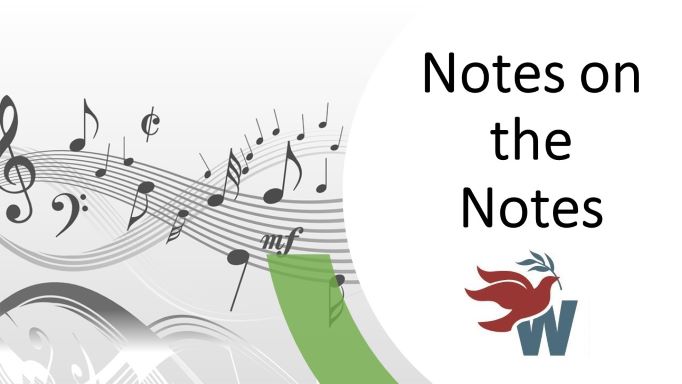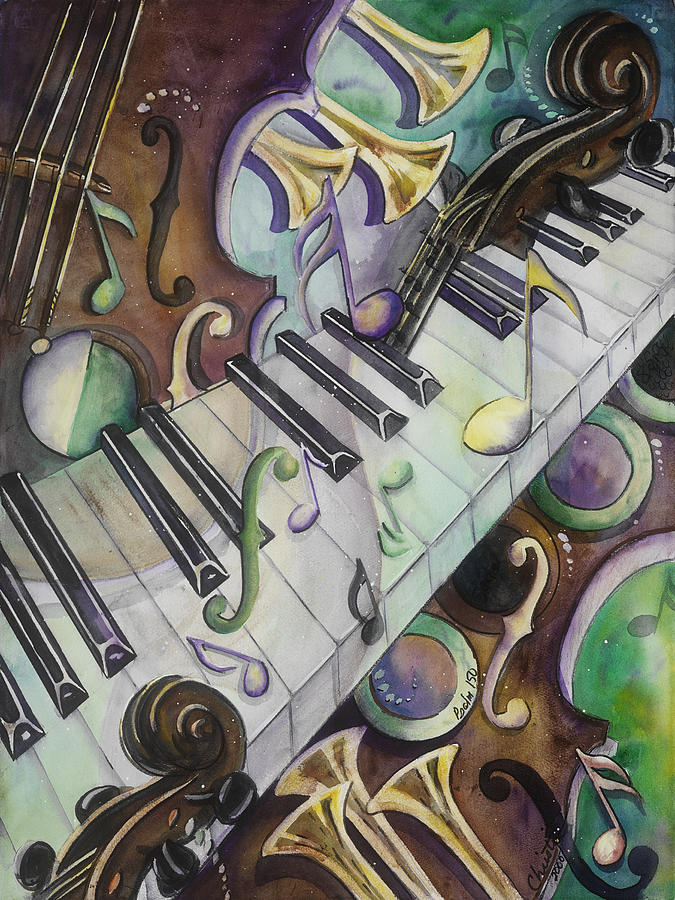Notes on the Notes – August 18, 2024

This week’s music:
“Praise the Lord with the Sound of Trumpet” (VU #245)
“Praise the Lord with the sound of trumpet,
Praise the Lord with the harp and lute,
Praise the Lord with the gentle-sounding flute
Praise the Lord in the field and forest,
Praise the Lord in the city square,
Praise the Lord anytime and anywhere.
Praise the Lord in the wind and sunshine,
Praise the Lord in the dark of night,
Praise the Lord in the rain or snow or in the morning light.
Praise the Lord in the deepest valley,
Praise the Lord on the highest hill,
Praise the Lord, never let your voice be still.

Psalm 150 painting by Christie Michael
Praise the Lord with the crashing cymbal,
Praise the Lord with the pipe and string,
Praise the Lord with the joyful songs you sing.
Praise the Lord on a weekday morning,
Praise the Lord on a Sunday noon,
Praise the Lord by the light of sun or moon.
Praise the Lord in the time of sorrow,
Praise the Lord in the time of joy,
Praise the Lord every moment, nothing let your praise destroy.
Praise the Lord in the peace and quiet,
Praise the Lord in your work or play,
Praise the Lord everywhere in every way!
This hymn, based on Psalm 150, was written by Natalie Sleeth in 1975.
Hear the song played on piano at: https://www.youtube.com/watch?v=QTCvz9v5XII
“Alleluia” (MV #50)
“Alleluia, alleluia, alleluia, alleluia.”
Our sung response to the Words of Assurance has music written by Norah Duncan IV (1987).
“Morning Has Broken” (VU #409)
“Morning has broken like the first morning,
Blackbird has spoken like the first bird.
Praise for the singing! Praise for the morning!
Praise for them, springing fresh from the world!
Sweet the rain’s new fall sunlit from heaven,
Like the first dew fall on the first grass.
Praise for the sweetness of the wet garden,
Sprung in completeness where God’s feet pass.
Ours is the sunlight! Ours is the morning
Born of the one light Eden saw play!
Praise with elation, praise every morning,
God’s recreation of the new day!”
Did you know that the hymn, “Morning Has Broken” was first published in 1931? In the publication, Songs of Praise Discussed, the editor explains that, as there was need for a hymn to give thanks for each day, English poet and children’s author Eleanor Parjeon had been “asked to make a poem to fit the lovely Scottish tune.” The words were inspired by the beauty seen in the village of Alfriston in East Sussex, England, then set to a traditional Scottish Gaelic tune, BUNESSAN (first seen in print in 1888).
English pop musician and folk singer, Cat Stevens, included a version on his album Teaser and the Firecat in 1971 and then released the song as a single in 1972. The song became identified with Stevens due to the popularity of this recording. The piano arrangement on Stevens’ recording was composed and performed by Rick Wakeman, a classically trained keyboardist who joined the English progressive rock band, Yes, soon afterwards. (Source: Wikipedia)
Hear Cat Stevens sing the song at: https://www.youtube.com/watch?v=GXWI6ISkzlI
“I Love to Tell the Story” (VU #343)
“I love to tell the story of unseen things above,
Of Jesus and his glory, of Jesus and his love.
I love to tell the story, because I know ’tis true;
It satisfies my longings as nothing else can do.
I love to tell the story, ’twill be my theme in glory,
To tell the old, old story of Jesus and his love.
I love to tell the story, more wonderful it seems
Than all the golden fancies of all our golden dreams.
I love to tell the story, for some have never heard
The message of salvation from God’s own holy Word.
I love to tell the story, for those who know it best
Seem hungering and thirsting to hear it like the rest.
And when, in scenes of glory, I sing the new, new song,
‘Twill be the old, old story that I have loved so long.”
Arabella Katherine Hankey (1834-1911) grew up in the family of a wealthy English banker associated with the evangelical wing of the Anglican Church. As a teenager she taught a girls’ Sunday school class. Later she traveled to South Africa to serve as a nurse and to assist her invalid brother.
While recovering from a lengthy illness of her own at age 30, she wrote a poem on the life of Christ. This poem had two sections, the first published in January 1866 and entitled The Story Wanted, the second published later that year in November under the title The Story Told. The hymn “I Love to Tell the Story” is drawn from stanzas in the second section. The text of the refrain was written by the composer of the music, William G. Fisher, in 1869.
Hear the Chuck Wagon Gang at: https://youtu.be/-xgbsC_zL50
Hear Eddy Arnold sing the hymn at: https://youtu.be/0BE_SryWgNY
“What Can I Do?” (MV #191)
“What can I do? What can I bring?
What can I say? What can I sing?
I’ll sing with joy. I’ll say a prayer.
I’ll bring my love.
I’ll do my share.”
This joyful song of offering and dedication was written by Paul Rumbolt and Michele McCarthy (2005). The arrangement in More Voices is by Alan C. Whitmore.
“Break Now the Bread of Life” (VU #501)
“Break now the bread of life, Saviour, to me,
As once you broke the loaves beside the sea.
Beyond the sacred page I seek you, Lord;
My spirit waits for you, O Living Word.
Bless you own truth, dear Christ, to me, to me,
As when you blessed the bread by Galilee;
Then shall all bondage cease, all fetters fall,
And I shall find my peace, my all-in-all.”
This hymn has words by Mary Artemisia Hathbury (1877) with music by William Fisk Sherwin (1877). Inspired by Jesus’ feeding of the multitude (Matthew 14:13-21; Mark 6:39-44), this two-stanza hymn was composed on the shores of Lake Chautauqua (New York) in 1877 at an educational experience for training Sunday school teachers during the summer.
Though sung often as a Communion hymn, this is one of the few classic hymns on Christian Scripture. “Break thou the bread of life” focuses on the relationship between the Christ found in the “sacred page” and the individual reader of the Bible. Lathbury’s message is that the Christ of the Scripture brings “truth,” breaks the power of “bondage,” and provides “peace” to each person who shares the “bread of life.” (Source: https://www.umcdiscipleship.org/resources/history-of-hymns-break-thou-the-bread-of-life)
See an acapella version of the hymn at: https://www.youtube.com/watch?v=NQpj4TSe-Ec
“He Leadeth Me” (VU #657)
“He leadeth me; O blessed thought!
O words with heavenly comfort fraught!
Whate’er I do, where’er I be, still ’tis God’s hand that leadeth me.
Sometimes ‘mid scenes of deepest gloom,
Sometimes where Eden’s bowers bloom,
By waters calm, o’er troubled sea,
Still ’tis his hand that leadeth me…
Lord, I would clasp thy hand in mine,
Nor ever murmur nor repine,
Content, whatever lot I see,
Since ’tis my God that leadeth me…
And when my task on earth is done,
When by thy grace the victory’s won,
Even death’s cold wave I will not flee,
Since God through Jordan leadeth me…
He leadeth me! He leadeth me!
By his own hand he leadeth me!
His faithful follower I would be,
For by his hand he leadeth me!
Our closing hymn was written by Joseph Henry Gilmore (1862), with music by William Batchelder Bradbury (1864). Gilmore started his text based on Psalm 23; specifically verse 2, “he leadeth me beside the still waters.” It was written in Philadelphia in March, 1862, during the American Civil War. His wife submitted the poem to the Boston journal, Watchman and Reflector, where William B. Bradbury saw it. Bradbury adapted the hymn text to a verse and refrain structure and published his setting in Golden Censer (1864). Gilmore discovered his hymn in a new gospel songbook while visiting another city, and was quite amazed at its growing popularity.
Gilmore provided further information on the historical context of this hymn:
It was the darkest hour of the Civil War. I did not refer to that fact—that is, I don’t think I did—but it may subconsciously have led me to realize that God’s leadership is the one significant fact in human experience, that it makes no difference how we are led, or whither we are led, so long as we are sure God is leading us.
Stanza 2 of the hymn may suggest the ethos of the national crisis. Drawing on Psalm 23:4a; “Yea, though I walk through the valley of the shadow of death, I will fear no evil” (KJV), Gilmore begins: “Sometimes mid scenes of deepest gloom…”
In stanza 3, the poet offers a particular theological interpretation of Psalm 23:4b: ”thy rod and thy staff they comfort me.” In doing so, he reflects on the concept of complete submission to God’s will found in many gospel songs of this era.
Psalm 23:6, “Surely goodness and mercy shall follow me all the days of my life: and I will dwell in the house of the LORD forever” (KJV), provides a basis for the final stanza of the hymn, drawing upon the familiar image of the Jordan River cited throughout Scripture, especially as the place of Jesus’ baptism (Matthew 2:13) and a place where Jesus often conducted his ministry (Matthew 4:25; Mark 3:7-8), and ultimately the passageway from this life to the next.
As is the case with so many gospel songs, the rhetorical strength of this hymn lies in the almost incessant repetition of a single thought: “He/God leadeth me.” When the five quotations of this idea in the four stanzas are added to the three references in the refrain, the singer will have sung “He/God leadeth me” a total of seventeen times by the time the hymn is concluded!
Though Gilmore wrote other hymns, it is this hurriedly penned text written at age 28 for which he is remembered. The First Baptist Church of Philadelphia was demolished in 1926. Kenneth Osbeck notes, however, that the words to the first stanza of Gilmore’s hymn appear on a bronze tablet on the large office building that replaced the church with the inscription, “in recognition of the beauty and fame of this beloved hymn, and in remembrance of its distinguished author” (Osbeck, 1982, 88). (Source: https://www.umcdiscipleship.org/resources/history-of-hymns-he-leadeth-me-o-blessed-thought)
Sing along with the London Fox Singers at: https://www.youtube.com/watch?v=oAcgX3Aqo9g
“I’m Gonna Live So God Can Use Me” (VU #575)
“I’m gonna live so God can use me anywhere, Lord, any time.
I’m gonna live so God can use me anywhere, Lord, any time.
I’m gonna work so God can use me anywhere, Lord, any time.
I’m gonna work so God can use me anywhere, Lord, any time.”
This traditional African-American spiritual is from the Presbyterian Hymnal (1990). As our worship service comes to end, we go into the world ready to be used by God “anywhere, any time.”
This week we will be having a “Pop-up Choir” lead the music in worship!
If you would like to help lead the congregational singing this week, please come at 9:45 a.m. on Sunday to run through the music – all welcome!
Categories: Notes on the Notes


You must be logged in to post a comment.